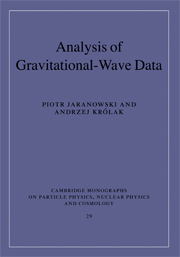Book contents
- Frontmatter
- Contents
- Preface
- Notation and conventions
- 1 Overview of the theory of gravitational radiation
- 2 Astrophysical sources of gravitational waves
- 3 Statistical theory of signal detection
- 4 Time series analysis
- 5 Responses of detectors to gravitational waves
- 6 Maximum-likelihood detection in Gaussian noise
- 7 Data analysis tools
- Appendix A The chirp waveform
- Appendix B Proof of the Neyman–Pearson lemma
- Appendix C Detector's beam-pattern functions
- Appendix D Response of the LISA detector to an almost monochromatic wave
- Appendix E Amplitude parameters of periodic waves
- References
- Index
3 - Statistical theory of signal detection
Published online by Cambridge University Press: 08 January 2010
- Frontmatter
- Contents
- Preface
- Notation and conventions
- 1 Overview of the theory of gravitational radiation
- 2 Astrophysical sources of gravitational waves
- 3 Statistical theory of signal detection
- 4 Time series analysis
- 5 Responses of detectors to gravitational waves
- 6 Maximum-likelihood detection in Gaussian noise
- 7 Data analysis tools
- Appendix A The chirp waveform
- Appendix B Proof of the Neyman–Pearson lemma
- Appendix C Detector's beam-pattern functions
- Appendix D Response of the LISA detector to an almost monochromatic wave
- Appendix E Amplitude parameters of periodic waves
- References
- Index
Summary
Data from a gravitational-wave detector are realizations of a stochastic (or random) process, thus in order to analyze them we need a statistical model. In this chapter we present a theory of the detection of signals in noise and an estimation of the signal's parameters from a statistical point of view. We begin in Section 3.1 with a brief introduction to random variables and in Section 3.2 we present the basic concepts of stochastic processes. A comprehensive introduction to mathematical statistics can be found, for example, in the texts [116, 117]. Our treatment follows the monograph [118]. Other expositions can be found in the texts [119, 120]. A general introduction to stochastic processes is given in [121]. Advanced treatment of the subject can be found in [122, 123].
In Section 3.3 we present the problem of hypothesis testing and in Section 3.4 we discuss its application to the detection of deterministic signals in Gaussian noise. Section 3.5 is devoted to the problem of estimation of stochastic signals. Hypothesis testing is discussed in detail in the monograph [124]. Classical expositions of the theory of signal detection in noise can be found in the monographs [125, 126, 127, 128, 129, 130, 131].
In Section 3.6 we introduce the subject of parameter estimation and present several statistical concepts relevant for this problem. Parameter estimation is discussed in detail in Ref. [132], and Ref. [133] contains a concise account. In Section 3.7 we discuss topics related to the non-stationary stochastic processes.
Information
- Type
- Chapter
- Information
- Analysis of Gravitational-Wave Data , pp. 51 - 98Publisher: Cambridge University PressPrint publication year: 2009
